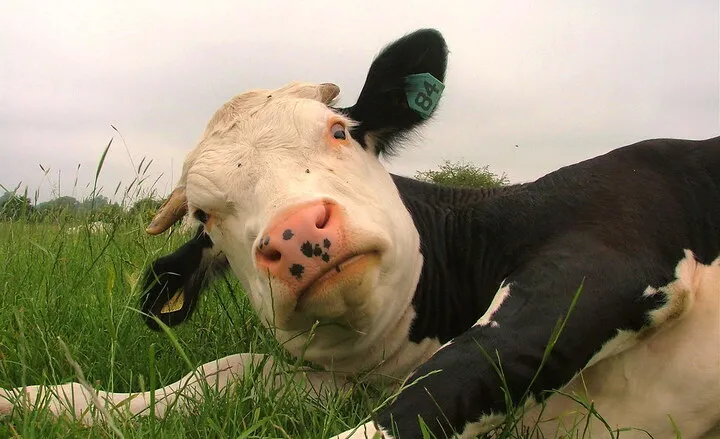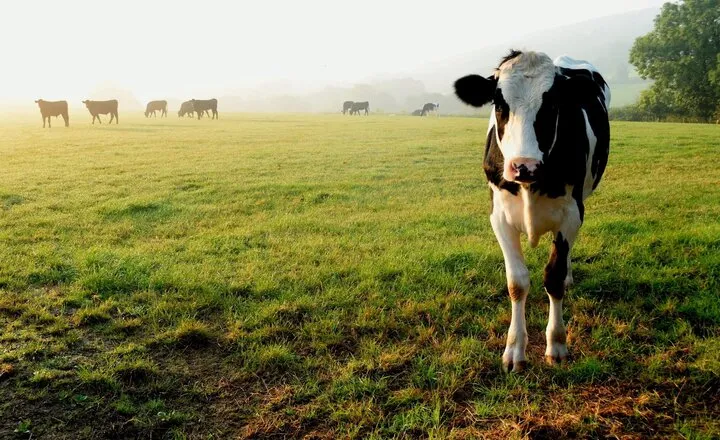Cows, often seen as gentle creatures grazing peacefully in the fields, may surprise you with their potential to bite. While it’s not common for cows to intentionally bite humans, they are capable of doing so when provoked or feeling threatened. Understanding Do Cows Bite? and behavior of cows can help prevent any potential biting incidents.
Can Cows Bite?
They do not have the physical capability to bite due to their unique jaw structure and lack of upper teeth. Their mouths are designed for grazing on grass and other plant-based foods, not for biting. Even if a cow were to attempt to bite, it would only be able to use its gums, which would not cause any harm.
It is important for people to understand that cows are gentle herbivores that typically do not display aggressive behavior towards humans.
They are known for their docile nature and are more likely to exhibit behaviors such as nibbling or grooming rather than biting. So there is no need to worry about being bitten by a cow while interacting with them in a safe and respectful manner.
Can Calves Bite?
Yes, calves can indeed bite. While adult cows have limited ability to bite due to their dental structure, calves are more likely to use their mouths as a way to explore and interact with their surroundings.
Like puppies, calves may nibble or chew on objects, including a farmer’s arm if they are curious or seeking attention. It is important for farmers and handlers to be cautious around young calves to prevent any accidental bites or injuries.
It is worth noting that biting behavior in calves can often be mitigated through proper training and handling techniques. By providing appropriate outlets for their natural curiosity and ensuring they receive adequate care and attention, the likelihood of calves resorting to biting can be reduced.
Is A Cow Bite Dangerous?
A cow bite is generally not considered dangerous. Cows have a single row of front teeth at the bottom and a soft dental pad at the top, which means their bites are not very strong or harmful. Their weak jaw muscles also limit the force they can exert while biting.
It would not result in serious injury or bleeding due to the structure of their teeth. Cows primarily use their large, flat back teeth to chew food in a circular motion, as they are herbivores and do not need strong jaw muscles like carnivores.
While it’s always important to be cautious around animals, especially larger ones like cows, their bites are typically more of a warning or defensive gesture rather than an aggressive attack.
How Often Do Cows Bite?
Cows are not known to bite as their primary form of aggression. They usually resort to kicking or pushing with their horns when feeling threatened or agitated. If a cow feels provoked or if someone puts their fingers or hand in the cow’s mouth, there is a possibility of being bitten.

It is important to exercise caution and avoid putting body parts near a cow’s mouth to prevent any potential injuries.
Reasons Why Cows Do Not Bite
Cows do not bite primarily because they lack the appropriate dental structure and jaw strength for biting. They have other ways of defending themselves or showing aggression.
Lacking Upper Incisors
Cows lack upper incisors and instead have a soft rubbery patch of skin called a dental pad. This unique adaptation allows cows to crush up forage by pressing it against the dental pad with their tongues.
While cows do have top and bottom molars for grinding food, they are not used during the initial biting action. The combination of the dental pad and their tongues helps cows hold onto grass and forage while eating, but they are unable to bite down on something due to lacking upper incisors.
With not being able to bite in the traditional sense, cows are still able to effectively consume their food through a process of crushing and grinding with their molars.
Their specialized dental structure is well-suited for their herbivorous diet, allowing them to efficiently break down tough plant material.
Not Adept at Vertical Biting
Cows have a unique jaw structure that is specifically designed for their herbivorous diet. Their jaw moves laterally in a circular motion, allowing them to grind grass and other plant-based food efficiently.
This lateral movement helps them chew the food thoroughly so they can absorb the necessary nutrients from it. Unlike carnivores, cows do not have strong vertical biting capabilities due to the nature of their jaw muscles.
This specialized jaw structure of cows reflects their evolutionary adaptation to grazing on grasses and other vegetation.
By chewing their food in a lateral motion, cows are able to break down tough plant material effectively, enabling them to extract the nutrients they need for energy and growth.
How Do Cows Show Aggression?
They can show aggression in a few ways, especially when they feel threatened or are protecting their calves. While cows do not bite, they may use their weight and horns to intimidate or harm others.
Cow tipping, a practice where people try to push over sleeping cows, can also lead to aggressive behavior as it startles and distresses the animals. They have been known to deliver powerful kicks with their hind legs if they feel cornered or in danger.

It’s important to remember that cows are not inherently aggressive animals and typically avoid confrontation. They are more likely to defend themselves using their physical strength rather than engaging in fights.
Understanding how to approach and interact with cows respectfully can help prevent any potential aggression and ensure the safety of both humans and animals.
Conclusion
The question of whether cows bite is not a simple one to answer. While it is true that cows are generally gentle herbivores, they are capable of biting if they feel threatened or provoked.
Understanding their behavior and body language can help prevent any potential bites. It is important for individuals, especially those working closely with cows, to exercise caution and respect around these animals.
By being informed and taking necessary precautions, we can ensure a safe and harmonious relationship with our bovine companions.
FAQs
What to do if a cow is chasing you?
If a cow is chasing you, it’s important to stay calm and try not to panic. Running away may trigger the cow’s instinct to chase you further.
How to tell if a cow is angry?
If the cow starts pawing at the ground or stomping its feet, which can be a display of frustration or irritation.
How do you calm a cow?
Cows can be calmed by speaking to them in a soothing tone and approaching them slowly and gently. Avoid sudden movements or loud noises that may startle them.
